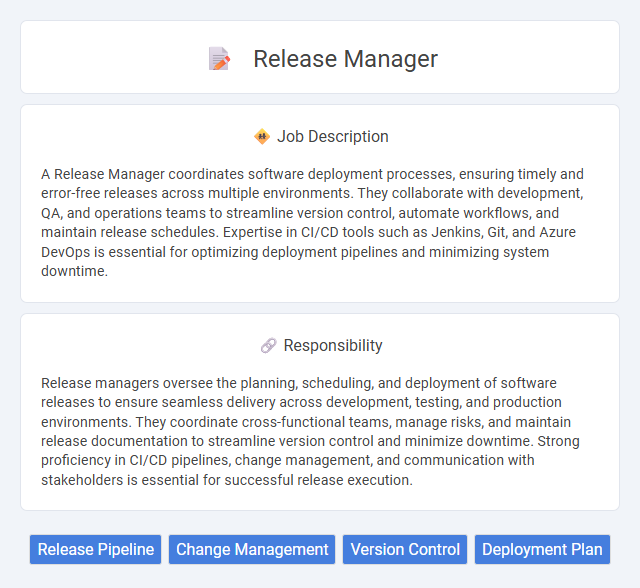
A Release Manager coordinates software deployment processes, ensuring timely and error-free releases across multiple environments. They collaborate with development, QA, and operations teams to streamline version control, automate workflows, and maintain release schedules. Expertise in CI/CD tools such as Jenkins, Git, and Azure DevOps is essential for optimizing deployment pipelines and minimizing system downtime.
Individuals with strong organizational skills, attention to detail, and the ability to work under pressure are likely suitable for a Release Manager role. People who enjoy coordinating cross-functional teams and managing complex timelines probably find this job fulfilling. Those who struggle with communication or adaptability may face challenges in this fast-paced environment.
Qualification
A Release Manager typically requires a strong background in software development, project management, and IT operations, with proficiency in tools like Jenkins, Git, and Kubernetes. Certifications such as ITIL, PMP, or Agile Scrum Master enhance qualifications by demonstrating expertise in managing release cycles and cross-functional teams. Experience in continuous integration/continuous deployment (CI/CD) pipelines and familiarity with cloud platforms like AWS or Azure are highly valued for optimizing software delivery processes.
Responsibility
Release managers oversee the planning, scheduling, and deployment of software releases to ensure seamless delivery across development, testing, and production environments. They coordinate cross-functional teams, manage risks, and maintain release documentation to streamline version control and minimize downtime. Strong proficiency in CI/CD pipelines, change management, and communication with stakeholders is essential for successful release execution.
Benefit
A Release Manager likely improves software delivery efficiency by coordinating development, testing, and deployment processes. This role probably enhances communication between teams, reducing the risk of errors and delays in product releases. Companies may benefit from increased product stability and faster time-to-market as a result of a Release Manager's oversight.
Challenge
Release manager roles likely involve navigating complex coordination challenges among development, QA, and operations teams to ensure timely and smooth software deployments. They probably face the difficulty of balancing rapid release cycles with maintaining high-quality standards and minimizing risks. Managing unexpected issues during releases often requires quick problem-solving and effective communication under pressure.
Career Advancement
A Release Manager plays a critical role in coordinating software deployments, ensuring seamless integration and delivery within the DevOps pipeline. Expertise in version control, continuous integration/continuous deployment (CI/CD) tools, and agile methodologies leads to opportunities for senior managerial positions or specialization in release automation. Advancing in this career often involves gaining certifications like ITIL or PMP, developing project management skills, and expanding knowledge of cloud platforms and containerization technologies.
Key Terms
Release Pipeline
Release managers oversee the entire release pipeline to ensure smooth integration and deployment of software updates. They coordinate between development, quality assurance, and operations teams to automate build, test, and deployment processes, minimizing downtime and errors. Optimizing the release pipeline enhances continuous delivery, accelerates time-to-market, and maintains high software quality standards.
Change Management
A Release Manager oversees the planning, scheduling, and controlling of software builds and deployments, ensuring smooth transitions through rigorous change management processes. They coordinate cross-functional teams to evaluate, approve, and implement changes while minimizing risks and downtime. Effective release management integrates version control, testing, and compliance tracking to maintain system stability and meet business objectives.
Version Control
A Release Manager specializes in coordinating software version control processes to ensure smooth and timely deployment of updates. Proficient in tools like Git, Subversion, and Mercurial, they track code changes, manage branching strategies, and resolve merge conflicts to maintain code integrity. Mastery of version control systems enables Release Managers to automate build pipelines, enhance collaboration across development teams, and minimize production downtime.
Deployment Plan
A Release Manager oversees the creation and execution of a detailed deployment plan to ensure seamless software releases across development, testing, and production environments. The deployment plan includes scheduling, risk mitigation strategies, rollback procedures, and coordination with cross-functional teams to minimize downtime and maintain system stability. Effective deployment planning by the Release Manager directly impacts the success of continuous integration and continuous delivery (CI/CD) pipelines.
 kuljobs.com
kuljobs.com